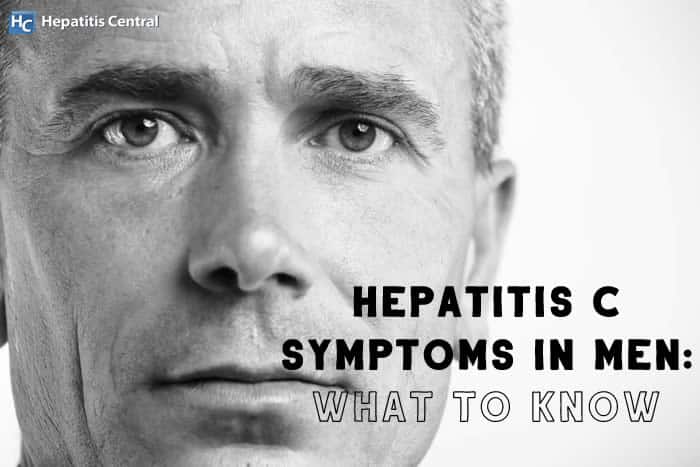Hepatitis C Symptoms in Men: What to Know


Hepatitis C is a form of liver disease caused by the hepatitis C virus (HCV) that may lead to cirrhosis and/or liver cancer. It often leads to liver scarring and inflammation leaving it hard for the liver to do its job (1).
Men tend to contract HCV at higher rates than women with 2.1 percent of men being diagnosed with HCV and only 1.1 percent of women being diagnosed in the U.S., with similar trends found in Europe (2). Not only do men contract HCV at differing rates than women, but they handle the viral load, onset to cirrhosis, and post-treatment symptoms differently than their female counterparts.
There are two phases to symptom expression: acute and chronic.
Acute Symptoms of Hepatitis C
As far as we can tell the acute symptoms of hepatitis C are similar for both men and women and are like the flu. Acute symptoms (3) are typically:
- Appetite loss
- Fatigue
- Fever
- Nausea
- Muscle aches
If symptoms are caught early enough, treatment can be given before complications set in. Acute symptoms appear one to three months after exposure and frequently go unnoticed.
Another complicating factor in early detection and treatment is that men often do not treat their symptoms or their diagnosis as women do. Studies show that men tend to ignore symptoms more often than women and opt not to report symptoms for many illnesses or to seek preventive health care (4).
Chronic Symptoms of Hepatitis C
If the viral load does not clear itself after a bout of acute hepatitis C, the disease may progress and become more chronic. Research shows that men proceed to scarring of the liver 39 percent faster than women, and about 73.6 of the cases of cirrhosis in the U.S. occur in men (2). It is theorized that estrogen has a protective effect in women as the incidence of HCV increases in women after menopause.
If the acute phase of HCV progresses, symptoms may be found such as:
- Yellowing of the eyes and skin
- Clay-colored stools
- Itching skin
- Spider-like vessels in the skin
- Swelling in the legs
- Fatigue
- Easy bruising
- Easy bleeding
- More pronounced appetite loss
- Dark-colored urine
- Depression
- Cognitive impairment
Many individuals are asymptomatic with chronic infection, which is predominately why 85% of the population does not know they even have the disease in the U.S. (2). It is estimated that chronic infection will develop in 89% of men and 63.4% of women. Treatment responses are similar between the sexes.
Male Specific HCV Symptoms
Men must deal with a different set of issues than women although, clearly, we do not know as much about HCV infection in women as men. Some of the differences include sexual response, hormonal alterations, and post-treatment symptoms.
Sexual Dysfunction in HCV Infection
Sexual dysfunction in the form of erectile and orgasmic features are clearly present. Erectile dysfunction is independent of depression and is associated with a decreased score on the Quality of Life Survey. HCV men were significantly less than controls to be satisfied with their sexual satisfaction as measured by sexual drive, erection, ejaculation, sexual problems, and overall satisfaction (5).
Hypogonadism in HCV Infection
Advanced liver disease influences testosterone production in hypogonadism, or testosterone deficiency. It is frequently not caught in early stages because testosterone is bound to a sex hormone binding globulin (SHBG), which is abnormally high in HCV infection. The free testosterone, or biologically active form, is still frequently low but that is usually not measured if a total testosterone is ordered which measures the testosterone bound to SHBG. Also, testosterone has a diurnal rhythm with the highest amounts found in the morning. In an HCV patient who likely has an abnormal SHBG level, measurement of free testosterone rather than total testosterone is recommended (6). Or, alternatively, a morning fasting total testosterone, free testosterone and SHBG can be ordered.
A low testosterone level can contribute to sexual dysfunction, erectile issues, and sexual dissatisfaction. Testosterone replacement therapy can result in improved sexual function, mood, anemia, and bone mineral density but does not influence energy level or cognitive function over the short term (6).
Low Testosterone Persists After HCV Treatment
Research (7) shows that even after sustained virologic response to treatment, testosterone levels remained low. This indicates a need for increased awareness of the problem with subsequent post-treatment screening for testosterone levels.
Heart Disease
Heart disease is the leading cause of death for U.S. males. Having HCV is an independent risk factor for heart disease (8). This may be, in part, due to the increase in homocysteine (9) seen in HCV. Homocysteine is linked to a high incidence of heart disease – and the levels of homocysteine is related to the level of erectile dysfunction in men infected with HCV.
12 Risk Factors for HCV
If you are having symptoms, think back to risk exposure. Are you at high risk for HCV? The risk categories are:
- Healthcare worker exposed to infected blood
- Injection of illicit drugs
- HIV infected
- Received a tattoo in an unclean environment using unsterile equipment
- Are a man
- Over 50
- Born between 1945-1956
- Were ever in prison
- Received clotting factor concentrates before 1987
- Received a blood transfusion or organ transplant before 1992
- Were born to a woman with a hepatitis C infection
- Have a history of nonalcoholic fatty liver disease
Prevention
Prevention of HCV infection can dramatically reduce infection rates. This is especially important if you are a risk taker. Some things you can do are:
- Practice safer sex (use both male and female condoms)
- Avoid rough sex
- Avoid sex with multiple partners
- Avoid using illicit drugs
- Be cautious about piercings and tattoos
- Avoid alcohol if infected
Reducing risks will also lessen the chance of contagion.
Importance of Being Informed
Early treatment means a better chance at recovery and fewer chances of transitioning into cirrhosis or liver cancer. Gender roles for men may shape poorer health maintenance and fewer health seeking behaviors compared to women. Men are less likely to report symptoms and pain or to seek medical care or routine check-ups and are more frequently engaged in risky behaviors than women (4).
It is not just the health of your liver to be concerned about, but the quality of life issues HCV brings with it. Research suggests that due to central nervous system defects caused by the HCV infection – depression, cognitive deficits and overall quality of life are adversely impacted (10).
Whether a man or a woman, having HCV is no joke and can be successfully treated if caught early, risky behaviors are reduced, and preventive measures are taken. It is important to understand that re-infection with HCV is possible even after viral clearance.
- Hepatitis C in men: symptoms, treatments and more. (n.d.) Healthline. Retrieved 1/28/2020 from https://www.healthline.com/health/hepatitis-c-in-men
- Baden, R., Rockstroh, J.K., Buti, M. (2014). Natural history and management of hepatitis C: does sex play a role? The Journal of Infectious Diseases, 209(3):581-585. https://doi.org/10.1093/infdis/jiu057
- What to know about hepatitis C in men. (n.d.) Medical News Today. Retrieved 1/28/2020 from https://www.medicalnewstoday.com/articles/323674.php
- Temple-Smith, M., Gifford, S. and Stoove, M. (2004). The lived experience of men and women with hepatitis C: implications for support needs and health information. American Health Review, 27(2):46-56. https://doi.org/10.1071/AH042720046
- Danoff A., Khan O., Wan D.W, Hurst L., Cohen D., Tanner C.T. and Bini E. J. (2006). Sexual dysfunction is highly prevalent among men with chronic hepatitis C virus infection and negatively impacts health-related quality of life. Am J Gastroenterol, 101(6):1235-43. Abstract retrieved from https://www.ncbi.nlm.nih.gov/pubmed/16771944
- Brown, T.T. (2019). Hypogonadism in men with hepatitis C: what is a clinician to do? Clinical Infectious Diseases, 69 (4):577-599. https://doi.org/10.1093/cid/ciy968
- Chaudhury C.S., Mee, T., Chairez, C., McLaughlin M., Silk, R., Gross, C. Kattakuhzy, S. and Hadigan, C. (2019). Testosterone in men with chronic hepatitis C infection and after hepatitis C viral clearance. Clinical Infectious Diseases, 69(4):571-576. https://doi.org/10.1093/cid/ciy965
- Cacoub, P. (2019). Hepatitis C virus infection, a new modifiable cardiovascular risk factor. Gastroenterology, 156(4):862-864. https://doi.org/10.1053/j.gastro.2019.02.009ff. ffhal-02272021
- Abdelhamid, A.A., Sherief, M.H., Nemr, N., Hassoba, H., and El-Sakka, A. (2018). Homocysteine, insulin-like growth factor one and oestrogen levels in patients with erectile dysfunction-associated chronic hepatitis C virus infection. Andrologia, 50(10). https://doi.org/10.1111/and.13116
- Foster, G.R. (2009). Quality of life considerations for patients with chronic hepatitis C. Journal of Viral Hepatitis,16:605-611. https://doi.org/10.1111/j.1365-2893.2009.01154.x







